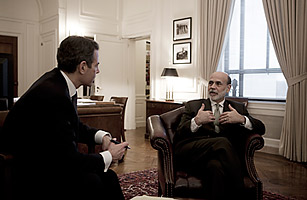
TIME's Managing Editor Richard Stengel talks with Federal Reserve Chairman Ben Bernanke during an interview in Washington, DC
(9 of 12)
Could you make the case in as simple a way possible for why the Fed should have increased regulatory authority?
Well, first, as I said, I think the very important part of a restructured regulatory system would be a way of looking at the system as a whole, a systemic approach that looks holistically at the entire regulatory system. I am not proposing the Federal Reserve to take that job. There have been other proposals made. For example, the Administration has proposed creating a council of regulators that would work together to identify emerging risks in the financial system, would help coordinate the efforts of different regulators, would look for regulatory gaps, and the like. So, I am not proposing, have never proposed that the Fed have responsibility for the broad financial system.
The Federal Reserve's existing authorities include being the umbrella supervisor of large banks. Other regulators may look at the companies which are owned in this banking organization, subsidiaries. The Federal Reserve is supposed to be looking at the company as a whole. And we think that so-called umbrella supervision of these large companies is a critical component of a systemic approach to regulation. So, we already have that authority.
We think the only expansion of authority which we think is appropriate would be to not only banks, but other large financial companies whose failure might pose significant risk to the financial system. That's the extension of responsibility that we think is appropriate.
Now, why the Federal Reserve, and why not some brand-new agency? A couple of reasons. First, these large companies are very complex. They operate in many different markets. They own many different kinds of companies, so an effective regulator of — umbrella supervisor of — one of these companies must have a wide range of economic and financial expertise. And there is no agency in Washington that has a wider range of financial expertise than the Federal Reserve, which we have to develop as we make monetary policy, analyzing the economy, analyzing how the economy is likely to evolve, monetary policy works in financial markets, so we have a wide range of expertise that makes us the natural supervisor for these large complex firms.
We have, by the way, identified, we are working hard to identify where we came up short before. And we are working hard to restructure our supervisory practice, our regulations, our whole approach to make sure that if we do get this — retain this authority — that we will do an effective job making sure that these companies are safe.
There's a second very important reason why the Federal Reserve ought to be doing that particular job, which is that the information that we get from being supervisors of these large financial firms, the expertise that we develop in supervising these firms, the authorities, relationships and so on that we develop in supervising these firms are very, very important for us in our role as financial stability — in our role in trying to support financial stability. Last fall is a perfect example. We made loans to — short-term loans to banks. We helped restore the functioning of critical financial markets.
And some investment banks had to become banks.
Exactly. In fact, when they became banks, their situation stabilized considerably, because the market had good confidence in the Federal Reserve's ability to oversee those companies. Last fall we needed that information in order to do what we did to stabilize the financial system in the fall of 2008, and in 2009. If we did not have that information, the expertise associated with it, those authorities, those relationships, we would not have been able to do what we did. And this is not just a one-time thing. There have been many previous examples of financial crises, or financial problems, where the Federal Reserve, because of its expertise, and because of the knowledge it gains through this supervision, was able to intervene and prevent a bigger problem.
Just the most recent example before this one was following 9/11, when, of course, the financial system was physically badly disrupted. The Federal Reserve led the effort to stabilize and restore the functioning of the financial system. It was our knowledge of the individual institutions, their funding positions, the role they play in the broader system of the companies involved in making payments between banks and other financial institutions. It was that knowledge, and that experience, that allowed us to lead the effort to restore functionality in the financial system relatively quickly.
So, do you have a point of view on the whole post Glass-Steagall era? I mean, should banks and investment banks be separate? Should there be a wall between them?
Well, the Glass-Steagall law enforced separation between commercial banks who make loans to all kinds of customers, and investment banks, who essentially operate in the securities markets.